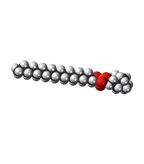Phase III Trial of Perifosine in Multiple Myeloma Halted
An ongoing phase III study comparing the efficacy and safety of perifosine in patients with relapsed or relapsed/refractory multiple myeloma has been discontinued.
An ongoing phase III study comparing the efficacy and safety of perifosine with placebo when combined with bortezomib (Velcade) and dexamethasone in patients with relapsed or relapsed/refractory multiple myeloma has been discontinued. Aeterna Zentaris Inc, the company that had been developing perifosine, an orally active alkylphosphocholine compound, announced March 13 that an independent data safety monitoring board (DSMB) recommended patient enrollment be stopped and the study halted following its preplanned interim analysis of efficacy and safety. Although no safety concerns were raised, the DSMB concluded that it was highly unlikely the study would achieve a significant difference in progression-free survival (PFS), its primary endpoint.

Space-filling model of perifosine
Three open-label, non-comparative, multicenter phase I/II studies had been conducted with perifosine in combination with bortezomib, involving a total of 171 patients. Final data from one trial were presented at the annual meeting of the American Society of Hematology by Paul Richardson, MD, associate professor of medicine at Harvard Medical School, and were published in the Journal of Clinical Oncology in 2011. Results showed a median overall survival of 25 months among 73 evaluable patients, including 30.4 months for 20 bortezomib relapsed patients and 22.5 months for 53 bortezomib refractory patients. Results also demonstrated a median PFS of 6.4 months for all evaluable patients, including 8.8 months for 20 bortezomib relapsed patients and 5.7 months for 53 bortezomib refractory patients. The authors concluded that the combination of perifosine and bortezomib, with or without the addition of dexamethasone, “demonstrated encouraging activity in heavily pretreated bortezomib-exposed patients with advanced [multiple myeloma].”
Investigators involved in the earlier trials had high hopes that the favorable tolerability of perifosine would lead to improved PFS and overall survival-an important unmet need in patients with relapsed or relapsed/refractory multiple myeloma. Commenting on the discontinuation of the phase III trial, Richardson told Cancer Network, “The interim look was initially planned to examine safety, and was later amended to also look at efficacy. The good news is that there were no safety issues identified, but unfortunately, no PFS difference was seen favoring the combination vs the control, and this prompted the decision to close the study.”
“Given the promising phase II data published, not only in JCO, but also from another phase II study published in the British Journal of Haematology (Jakubowiak et al, 2012), I agree the results were disappointing. The preclinical data were also very compelling (Hideshima et al: Blood 2006), making this result all the more surprising.
“There is potential risk in early looks at phase III trials in advanced myeloma for anything other than toxicity, especially in studies that have been relatively slow to accrue. However, as resources were constrained, the thought process here is understandable, and I am very respectful of the recommendation and decision in that context.”
Nonetheless, said Richardson, he remains “a believer in the targets (namely AKT, JNK, NFKB), which in my view are important in myeloma, and indeed the drug itself.” Thus, he said, he hopes evaluations of other inhibitors of these targets will be undertaken in the future.
“Perifosine showed some early promise, but unfortunately, this was not borne out by further studies and with so many exciting alternatives in the myeloma pipeline, I am not surprised at this decision,” commented Jeffrey Wolf, MD, director of the myeloma program at the University of California, San Francisco and co-investigator with Richardson in the phase II trial.
“We are obviously disappointed with the outcome of the interim analysis as reported to us by the DSMB, both from a patient and company perspective,” said Juergen Engel, PhD, Aeterna Zentaris president and CEO. He said the company will “remain focused on other significant opportunities” with other compounds in development, including AEZS-108, currently in a phase III trial in endometrial cancer and phase II trials in breast, prostate, and bladder cancer, as well as an earlier-stage oncology compound, AEZS-120.
Additional Source
Richardson PG, Eng C, Kolesar J, Hideshima T, Anderson KC. Perifosine, an oral, anti-cancer agent and inhibitor of the Akt pathway: mechanistic actions, pharmacodynamics, pharmacokinetics, and clinical activity. Expert Opin Drug Metab Toxicol. 2012;8:623–633. Accessible here.
Navigating AE Management for Cellular Therapy Across Hematologic Cancers
A panel of clinical pharmacists discussed strategies for mitigating toxicities across different multiple myeloma, lymphoma, and leukemia populations.